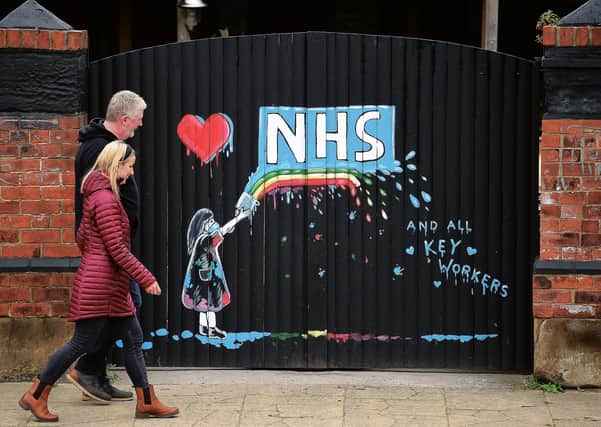Euan McColm: Fortunate few will be taught a lesson – with a bit of luck


I know people to whom this adage undoubtedly applies, people whose remarkable success is down to their talent and hard work.
I might have, from time to time, applied it to myself. I have the self-awareness to cringe at the memory.
Advertisement
Hide AdAdvertisement
Hide AdDuring occasional professional purple patches, I have contented myself that my success was entirely down to merit, ignoring the contact networks, the serendipitous meetings, and the right-place-right-timeness that’s behind much of what passes for my career in journalism. And that’s before we even get to the double head start I had in life by being white and male.
The problem with the idea that one is always the master of one’s destiny is not only that some us use it to big ourselves up but that it may be used to explain and excuse inequalities. If other aren’t doing so well in life, perhaps they should try working harder. And if we travel down this particular path, before long we’ve arrived at “Yeah, of course, there’s some of them deserve our help but some of them don’t even want to work.”
But this attitude doesn’t validate the idea that opportunity is truly equal, it simply exposes a lack of empathy.
One upside of the current coronavirus crisis is that empathy is back in fashion. The sense that we, truly, are all in this together is real (yes, puffed-up internet bores will point to the fact that Prince Charles was able to get a test for the virus while many others – including frontline NHS staff – have been unable to do so as proof that society is as hopelessly divided as ever, but they are as wrong as they are exhausting).
It’s true that, for some, privilege means safer and more comfortable lockdown, but nobody can be in any doubt that this damnable virus will find any weakness in our defences, regardless of who we are.
Even if we are not currently concerned about our finances, we feel the pressure in other ways. We agonise over separation from friends and relatives and worry about the rising death toll. That, we think, could be me. We look at photos of funerals and watch videos posted online by NHS staff and all of these things add to our unease. We may tell ourselves to try to keep things in proportion but the creeping sense of dread continues.
Measures introduced by the United Kingdom government to protect jobs are reassuring. Chancellor Rishi Sunak’s multi-billion-pound investment to guarantee a significant proportion of wages will save many families from destitution (for now) but none of us can be certain how long this crisis will last and what its longer term repercussions will be.
Some say that the state’s intervention at this time is proof that successive governments could have done more to ameliorate the impact of poverty throughout the years. If they can afford to underwrite wages and support the better off right now, then why couldn’t they have done more about inequality in the past?
Advertisement
Hide AdAdvertisement
Hide AdFor some – now departed Labour leader, Jeremy Corbyn, for example – the government’s reaction shouldn’t be seen as exceptional but as an example of how things should always be. The government’s response is, say Corbynistas, Labour-inspired and it proves that the sainted Jeremy was right about everything, all along.
This attitude betrays a reckless indifference to the financial cost of the government’s actions and the longer-term implications of billions of pounds of new debt. These are exceptional circumstances demanding an exceptional response from government. We mustn’t kid ourselves that intervention at the level now planned is sustainable over a long period of time.
But even if the coronavirus crisis does not bring about a fundamental reordering of society, it may have an impact on how we view the role of government when it comes to those worst off.
I wonder if some might find previously sceptical attitudes towards state intervention and benefits changing as the coronavirus crisis continues to disrupt our lives completely.
Suddenly, all of us – every single one of us – knows what it is to feel vulnerable. Money and status do not protect one from coronavirus.
This pandemic has shown us what a government can do when the chips are down. When we come through this crisis, will we forget that?
Coronavirus has exposed particular frailties in the system which, surely, will require attention. This will require us to think again about the redistribution of wealth. If we want better services, are we willing to pay more for them?
Both the UK and Scottish governments have presided over swingeing cuts to services in recent years. Because poor people are less likely to vote, the cuts have disproportionately hit them. Reductions in benefits, the closure of community facilities, cuts to social work projects and addiction support services, all of these things have hit those with least hardest.
Advertisement
Hide AdAdvertisement
Hide AdWill we come through this crisis and remain satisfied that these were always necessary and justifiable?
Our society has always depended upon the efforts of those at the bottom of the economic chain, the manual workers and support staff who take home very little and are often on zero hours contracts. The vital contribution these members of society make – the shop workers, the cleaners, the refuse collectors – has never been more clear than it is today.
So will we really come through this crisis and forget? Or will we think that, maybe, those who kept things moving, who ensured our streets were clean and our larders were full, deserve something better?
Some people might make their own luck but many more just can’t catch a break. The coronavirus pandemic has cast fresh light on this inequality.
When the crisis abates, perhaps we’ll find the energy for a renewed discussion about what constitutes a fair and progressive society